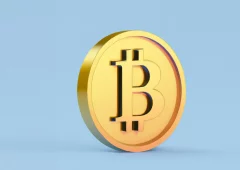U.S. Fiscal Alarm Bells Ring as Debt Soars and Economists Call for Safe Havens
24.05.2025 9:00 2 min. read Alexander Stefanov
As Washington pushes forward with new tax cuts and military funding, a growing number of economists are sounding the alarm on America’s ballooning debt.
One of them is David Rosenberg, who warns that the country’s debt-to-GDP ratio is now climbing past wartime levels, raising serious concerns about long-term stability.
In response, Rosenberg is urging investors to turn defensive. He recommends shifting toward gold, short-term Treasury bills, and even Asian currencies as safer assets in what he describes as a “looming storm.” Surprisingly, he also listed crypto as a speculative hedge—despite normally steering clear of riskier bets.
The recent House-approved legislation—dubbed the “Big Beautiful Bill”—offers immediate tax relief and defense spending boosts but at the cost of deepening the deficit. Rosenberg believes this will further strain the market, especially with the Federal Reserve staying hands-off and letting yields rise instead of absorbing excess debt as it has in past crises.
“The Fed’s passivity means higher borrowing costs ahead, which could crush both bond prices and stock valuations,” he said.
Fellow economist Peter Schiff echoed those concerns, calling the fiscal package one of the most reckless in modern history. He noted that projected deficits, even before the bill passed, were already approaching pandemic-era levels—warning they could now go even higher.
With policymakers pressing forward and central bankers stepping back, the message from experts is clear: prepare for turbulence, and seek shelter in assets that hold up when everything else breaks down.
-
1
Gold Beats U.S. Stock Market Over 25 Years, Even With Dividends Included
13.07.2025 15:00 1 min. read -
2
US Inflation Heats Up in June, Fueling Uncertainty Around Fed Cuts
15.07.2025 16:15 2 min. read -
3
U.S. Announces Sweeping New Tariffs on 30+ Countries
12.07.2025 16:30 2 min. read -
4
Key U.S. Economic Events to Watch Next Week
06.07.2025 19:00 2 min. read
US Inflation Heats Up in June, Fueling Uncertainty Around Fed Cuts
U.S. inflation accelerated in June, dealing a potential setback to expectations of imminent Federal Reserve rate cuts.
Gold Beats U.S. Stock Market Over 25 Years, Even With Dividends Included
In a surprising long-term performance shift, gold has officially outpaced the U.S. stock market over the past 25 years—dividends included.
U.S. Announces Sweeping New Tariffs on 30+ Countries
The United States has rolled out a broad set of new import tariffs this week, targeting over 30 countries and economic blocs in a sharp escalation of its trade protection measures, according to list from WatcherGuru.
Key U.S. Economic Events to Watch Next Week
After a week of record-setting gains in U.S. markets, investors are shifting focus to a quieter yet crucial stretch of macroeconomic developments.
-
1
Gold Beats U.S. Stock Market Over 25 Years, Even With Dividends Included
13.07.2025 15:00 1 min. read -
2
US Inflation Heats Up in June, Fueling Uncertainty Around Fed Cuts
15.07.2025 16:15 2 min. read -
3
U.S. Announces Sweeping New Tariffs on 30+ Countries
12.07.2025 16:30 2 min. read -
4
Key U.S. Economic Events to Watch Next Week
06.07.2025 19:00 2 min. read


